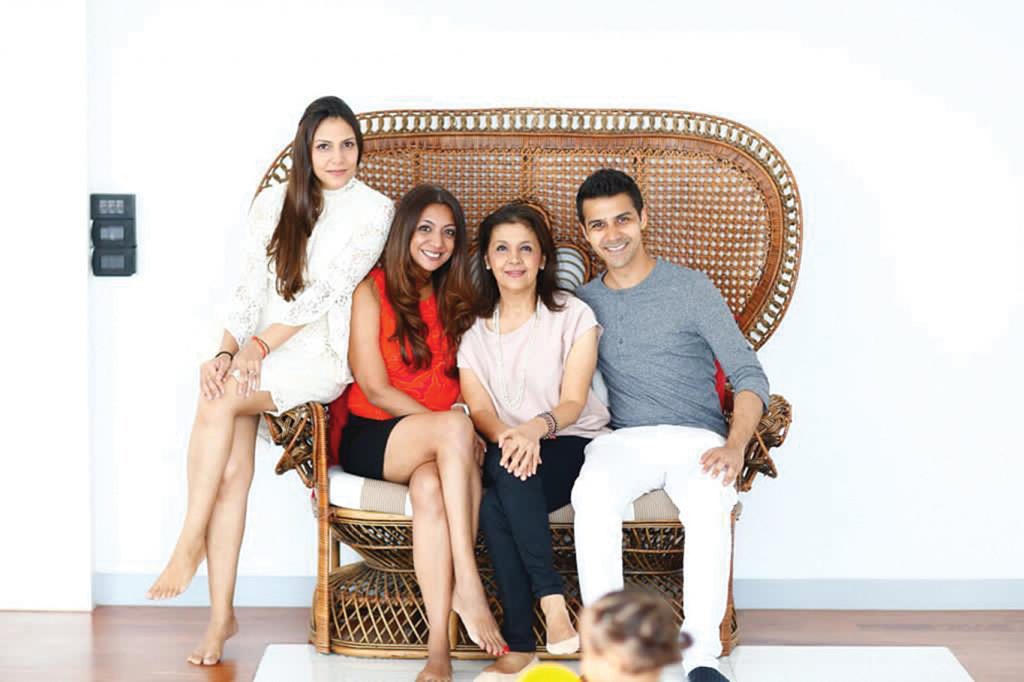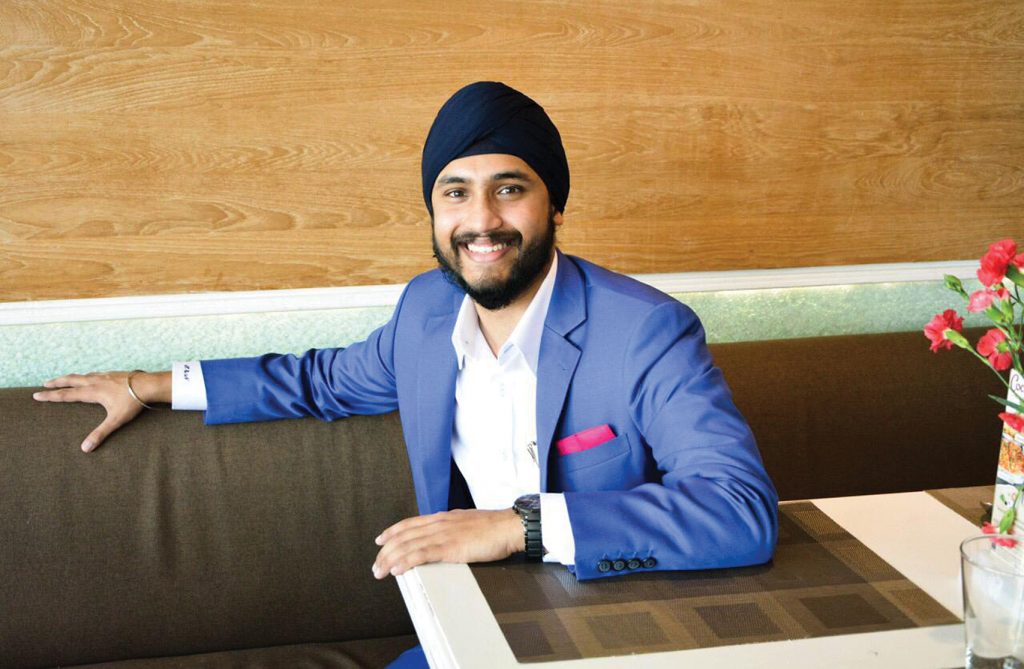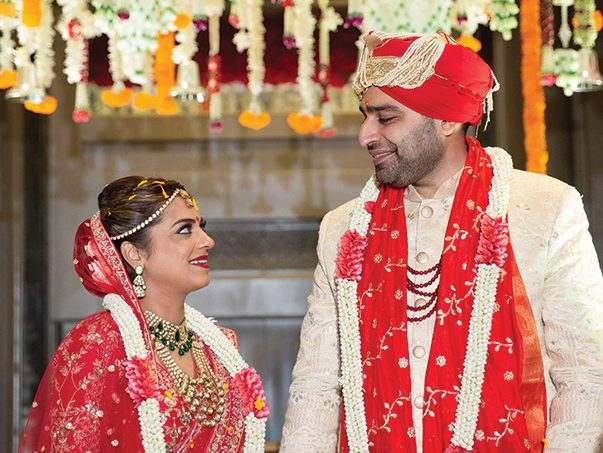The new “I do”.
By Kripa Singh
Last year, the unimaginable happened: the Indian wedding industry went from booming to shuttered overnight. On the onset of the global pandemic, all celebrations were indefinitely postponed, but after a few months of ambiguity and waiting, couples and wedding makers resurfaced with new plans. It turns out that, much like the very virus that has caused such disruption to the industry, Indian weddings are also evolving and adapting, and here’s how.
The rise of micro-weddings
Alas for your dad’s second cousin’s family, it is no longer considered improper to fail to invite them to your wedding, as downsizing guestlists have become a natural outcome of the pandemic. This means for the first time in forever, a truly intimate Indian wedding has become possible. The average group size for weddings over the last year appears to range between 200-350 guests, with some couples even choosing to have only 50 close family members and friends.
Inviting fewer guests has opened an array of opportunities for a unique wedding. For example, couples are getting married in more meaningful venues that they were unable to consider earlier. Different intimate spaces, like a vineyard in Hua Hin, a luxury boutique property in Chiang Mai, or even your own backyard, can make for beautiful and novel venues now.
Innovation instead of ostentation
There are now opportunities for couples to show wedding hospitality in more innovative ways. For instance, prior to COVID-induced travel restrictions, couples would often have performers fly in from various destinations to entertain their wedding guests. Now they have had to find other ways to make their wedding special. For example, many recent, smaller weddings have opted for full sit-down meals as opposed to buffets, which builds on the intimacy of the event. Couples can now connect with guests in a personalised way, such as including their favourite dish as part of the courses.
Brides have also gotten more unique with their outfits. Trousseau trips are no longer viable (which is great news for the immense carbon footprint Indian weddings usually have the bad reputation to be associated with). Instead, brides are relying on local skills and designers to curate outfits that are reflective of their own style, as well as more meaningful heirloom jewellery pieces from mothers or grandmothers.
The personalisation of décor is another aspect that has evolved for intimate groups, such as customised furniture, specialty cutlery, and bespoke table linens, giving creativity precedence over the conventional grand display.
Remembering what truly matters
Having been forced to deviate from the beaten path, many couples are finally challenging the general chronological sequence of wedding events. At a celebration with 4-5 different events prior to the actual wedding ceremony, it becomes easy to get distracted by the festivities and parties. Now, many couples are opting for very intimate and spiritual wedding ceremonies, followed by a celebration later instead, allowing them to prioritise their nuptials – the most important part.
As a result, there has been a wider reckoning among some couples, inspiring them to re-evaluate their priorities. Many aspects they once thought were imperative have become superfluous at the height of a global pandemic, making couples more flexible and guests less expectant. We have all been reminded of what a wedding is truly about – a celebration of two people’s union together with their family and loved ones.
Masala speaks to a few Thai-Indian wedding professionals and those who’ve been married during lockdown to get the inside scoop on what it’s been like to tie the knot in COVID times.

Ashwani Pawa
Wedding planner at Shanaya Celebrations & DJ
What changes in weddings have you seen, and which changes do you predict will happen?
We have noticed that events are gradually going back to basics, including only the necessary and important elements of a wedding. The guestlists now consist of only close family and friends, which in turn make events more intimate. For those who are not able to physically attend, new services such as live streaming have surfaced to allow them to still be a part of the celebrations.
We have also seen that our relationships with our vendors and partners have become even stronger as we all try to support and work with each other through these challenging times. This has increased job opportunities for various local vendors, as bringing ones in from abroad are not an option at this time.
While we are all hopeful that everything goes back to the way they were before, we do believe that small and intimate events will continue to be a part of the new norm.
What is a positive change that should be carried forward for all post-pandemic weddings too?
The intimacy of the events is one we hope to see more in the future as we have noticed that it makes the events more personal and focused on the couple.
What advice would you give to couples navigating weddings in 2021?
Given that all the planners and vendors are as ready as they were before the pandemic hit, the only advice we can give is to be alert with updated policies and guidelines. This will ensure a smooth process for the couple and their guests.
Nipunika Singh
Wedding decor designer at Elan Events
What about weddings have you personally noticed has changed?
The surge of ‘pintimate’ (personalised and intimate) weddings has been apparent. Couples are downsizing their guestlists and we foresee couples focusing more and more on providing their guests with a very personalised experience through more detail-oriented décor, specialised F&B, bespoke gifts, and unique venues. ‘Sequel weddings’ are also trending, with the wedding ceremony taking place first, followed by the celebrations scheduled for a time when the global situation has improved.
What is a positive change that you believe should be carried forward for all post pandemic-weddings?
Personalisation- it makes every wedding less generically cookie cutter and more unique. Hopefully, couples and wedding makers will continue to explore how to be more innovative and creative. The pandemic has also encouraged the use of more local skill and talent, which has been great for our carbon footprint.
Bearing this in mind, what advice would you give to future couples?
Be responsible, be safe, and continue having meaningful weddings. Release yourself from traditional obligations and highlight the components that are most important to you. Accept the ambiguity, and remember that your wedding is about enjoying yourself and your union with your partner.
Natasha Pathela
2020 bride
What did you do differently at your wedding as a result of COVID-19?
For one, we provided hand sanitisers and ensured temperatures of all guests were checked prior to entering each event. We also ensured all F&B was being handled with extreme precaution to make our guests feel safe.
What was the biggest challenge in planning a wedding at this time?
Getting my family and friends to attend our wedding from overseas was difficult due to the travel restrictions. We also tried to encourage guests to maintain some social distancing at our events, which is hard at an Indian wedding.
What was a (perhaps surprisingly) positive change that you experienced with your wedding?
Having a live Zoom feed helped us personalise interaction with all my family and friends around the world. A funny anecdote as a consequence of this, however, was realising that the live feed was also sending audio out on top of the video, so everyone around the world could hear our conversations without us realising.

Kabir Thakral
Owner of Coco’s Catering & Bangkok Hotel Lotus Sukhumvit
What are some changes you’ve experienced when catering weddings?
A major change was that all events decreased in size. Naturally once COVID is controlled in Thailand and more people start getting vaccinated, everything will be back to normal-ish. People want to party!
Another change we experienced was the process of setting up tables and creating menus. The number of guests per table was reduced and the distance between each table was increased. The fewer number of guests allowed us to get even more creative in terms of stalls, focusing more on individual plating décor. I see this trend continuing strongly, and it’s exciting as people take a lot of photos of food before they eat.
Any advice for couples with weddings this year?
I suggest couples and their families stay positive and hopeful, and plan ahead of time. Try your best to ensure you and your guests are safe, and choose a caterer that can adhere to all safety measures in food service.
Stalls are recommended during these times, rather than a buffet, as they ensure reduced contact, and the queues are spread out since stalls are set up to organise the flow of the guests.








